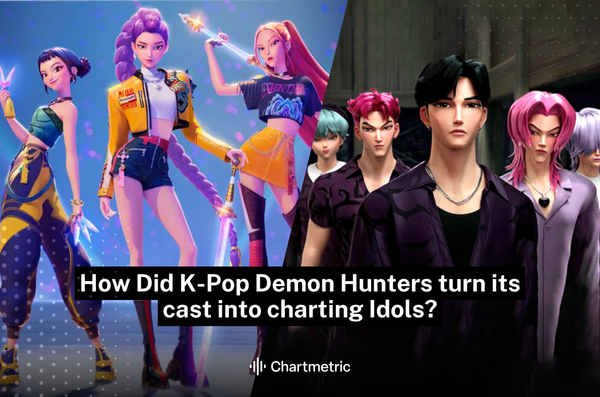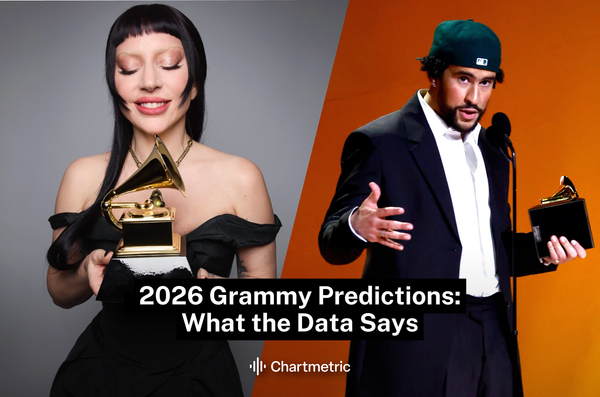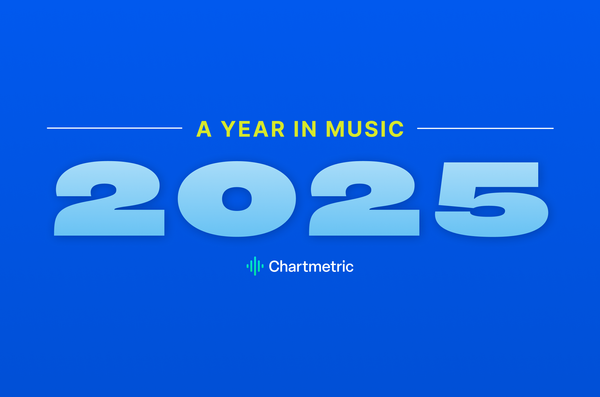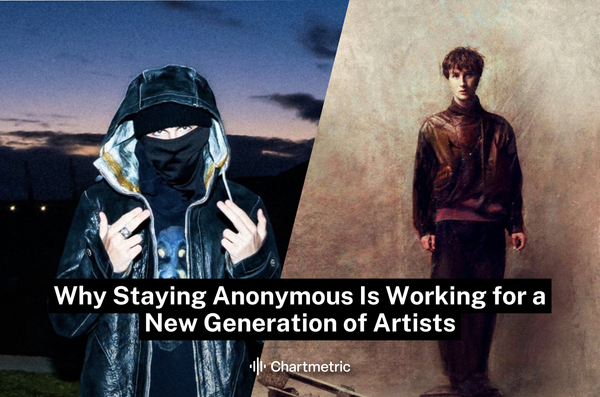If there’s one fanbase known for its unmatched commitment, it’s K-pop. Fans prove it by showing up over and over – organising streaming drives, breaking records, and following every breadcrumb of their favourite idols’ worlds. Since the genre’s global rise, this behaviour has only deepened with fans now moving fluidly across formats, treating the genre as something meant to be experienced everywhere at once.
This trans-media fluency is exactly what makes K-pop so open to experimentation. And Netflix’s K-Pop Demon Hunters leans directly into that. By launching two fictional groups, Huntr/x (Chartmetric rank: 18) and Saja boys (CM rank: 223) – backed by top-tier songwriters and even a cameo from TWICE (CM rank: 100) – the animated film about K-pop idols moonlighting as demon hunters leverages the devotion of K-pop fanbase and extends it to fictional acts.
This rise of the “cast-as-artist” phenomenon redefines how K-pop builds its worlds. It gives fictional acts the full backing of industry level machinery, which for Netflix meant assembling K-pop power players like Teddy Park (Blackpink’s Producer) and EJAE (CM rank: 16), the singer-songwriter behind hits for Red Velvet (CM rank: 1846) and Aespa (CM rank: 447). This star studded onboarding clearly paid off. Upon the film’s release it launched Huntr/x and Saja Boys with the same credibility as real world acts standing shoulder to shoulder with K-pop giants like BTS .
An experiment like this sits on a potential rocket ship, one that could launch cast-as-artist as the new norm, unlock new pipelines for creative talent ,and breathe fresh life into the genre during quieter intervals between major K-pop comebacks.
So the question may no longer be whether this model works, but whether character driven music will stay a side project or become a central strategy for building acts and moving genres in the future.
From here, the numbers tell the story.
The film’s soundtrack, released on July 20th, went beyond boosting awareness of K-Pop Demon Hunters. Within weeks, data across streaming, social, and radio painted a picture of the global impact – so much so that five of the top six slots on How Music Charts' "Trending Artist Widget" belonged to artists from the cast.
As for tracks, the standout hit “Golden” was built for main character energy. Spanning three octaves, the song weaves the storyline together with pop polish, punctuating Rumi’s (played by Arden Cho and voiced by EJAE) journey while showcasing the group’s believable artistry.”
Golden has since clocked 294M Spotify streams, topping charts in Malaysia, Singapore, and Philippines. The metrics confirm market behaviour identical to real-world K-pop hits, solidifying that Huntr/x and Saja Boys are viable chart players.
The soundtrack’s release shifted Spotify popularity scores across nearly every K-Pop Demon Hunters track. “Golden”, "How It’s Done", "Soda Pop" and "Your Idol" climbed into the 95-98 range, a territory usually reserved for BTS (CM rank: 48), Blackpink (CM rank: 23), or Stray Kids (CM rank: 222). “Score Suite” delivered the most unexpected leap , rising from 39 to 80 in under three weeks despite being a non-vocal track. Even previously dormant sync tracks like “Love, Maybe” and “Strategy” gained new momentum after months of plateau. The listeners engaged with the entire album like a debut album from a top tier group.
If there’s one platform that solidifies staying power, it’s TikTok. Golden had a three week head start on Blackpink’s JUMP, but by mid-July both were within striking distance with 129K vs. 110K creator videos on the platform. From there the gap widened. The weeks after, Golden climbed steadily toward the half million mark while JUMP flattened out.
From Screen To Stage
The scale of adoption around K-Pop Demon Hunters makes it clear this wasn’t a one off streaming blip. It shows how quickly fandoms will challenge the boundary between a fictional role and an actual recording career when the execution is sharp enough. SEA’s K-pop fanbase has long been fluent in transmedia engagement, following artists across variety shows, webtoons, game soundtracks, and brand tie-ins. Here, that same literacy made it natural to treat Huntr/x and Saja Boys as real world debuts.
The film also leans on a structural choice that sets it apart from earlier examples. K-Pop Demon Hunters taps established vocalists - Audrey Nuna (CM rank:45) , Leea Salonga (CM rank: 7510), Andrew Choi (CM rank: 204) to front the singing for on-screen characters voiced by others. In K-pop terms, that’s less a compromise than a familiar division of labor. It reflects how many idol tracks combine the work of external songwriters, session musicians, and performance coaches into one polished package, while still marketing a cohesive “group.”
The cast-as-artist model here flips the usual path of music IP. Instead of an established act lending credibility to the fictional world, the story itself becomes the launchpad for a commercially viable artist. In this case, Netflix holds the entire arc - the film, the characters, the music releases, and the fan engagement loop- all under one roof. That level of control means the story can be scaled across formats, from visual albums to docuseries to live experiences, with the soundtrack acting as a central driver rather than a byproduct.
The Future of Cast As Artists
This is a preview of where artist-building could go next. K-Pop Demon Hunters blurred the line between screen and stage, erased it, and then rebuilt it as a single arena where story, fandom, and music feed each other in real time.
For years, fictional bands and film soundtracks have flirted with the charts. What’s different now is the scale and the transmedia fluency that the K-pop fandom offers. Huntr/x and Saja Boys were born inside a scripted world, yet found themselves competing in the same space as real-world K-pop leaders without needing years of touring, media rounds, or label politics. That’s a structural advantage streaming era platforms are uniquely positioned to leverage.
And if Netflix can pull this off once, there’s no reason it can’t happen again- faster, bigger, and across more genres. Imagine a global release slate where every high stakes drama, animated film, or game adaption comes with it a built-in music act. One that’s ready to chart the moment it drops. Fiction becomes the incubator, the fanbase comes pre-assembled, and the music IP is wholly owned.
The takeaway isn’t that fictional artists can compete with BTS or Blackpink. It’s that they are already doing it. And in doing so they've opened a door to a new world where character driven music is not a foil but the main event.
If the next decade of music discovery belongs to cast as artist, K-Pop Demon Hunters just showed how that future might be written. And it starts with a story.






